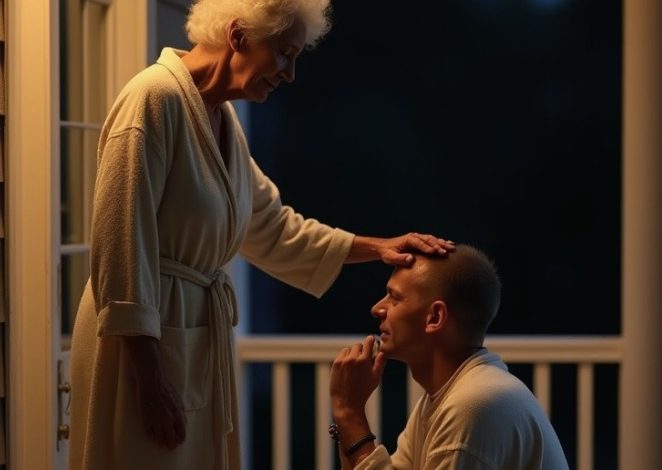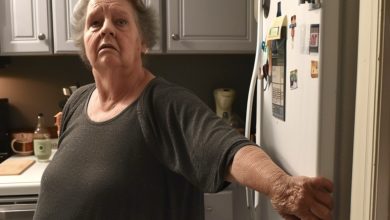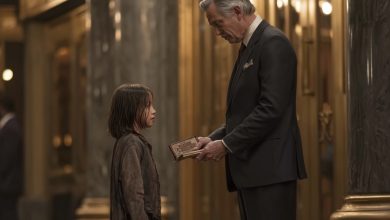“She Thought I Was Just a Retired Mother—She Never Expected What I Did to Protect My Family”

“At 2 a.m., my son collapsed at my door: ‘Mom, she took everything.’ I poured him coffee, made one short call—and by dawn, my daughter-in-law was standing before a judge.”
The pounding on my door came like thunder in the silence of night. Two in the morning is a dangerous hour—too late for visitors, too early for anything good. For most women my age, living alone at sixty-four, that sound would have been terrifying. But after thirty years as a federal judge, I had faced down cartel leaders, con artists, and men who thought power gave them immunity. There was very little left in this world that could truly frighten me.
I tied the belt on my silk robe, a poor shield against whatever waited on the other side, and peeked through the peephole. My son, Michael, leaned against the frame like a man defeated. The moonlight painted him pale, his expensive suit wrinkled, his hair sticking in damp tufts, his face streaked with sweat and tears.
“Mom,” he whispered when I opened the door, his voice breaking with the same fragility he’d had as a boy. “She’s gone. Amanda’s gone. And she took everything.”
I steadied him with an arm, guiding him through the hallway into my kitchen. The oak table stood where it always had, the place where I had once helped him with multiplication tables and later listened to him dream about law school. Tonight, my thirty-five-year-old son, polished attorney and father of two, sank into that chair looking smaller than I’d seen him in decades.
“Tell me everything,” I said softly, already reaching for the coffee maker. In my home, conversations of this weight required ritual: the sound of water filling the machine, the hiss of brewing, the familiar smell of beans grounding us in the ordinary while chaos pressed at the edges.
Michael pressed trembling hands to his face. “I came home tonight and the house… it was empty. Not just her things—everything. The furniture, the paintings, even the kids’ toys. She stripped it bare.” His voice broke again. “When I checked the accounts, every dollar was gone. The savings. The business funds. Even Emma and Jake’s college money.”
I poured two cups of coffee, adding cream to his without asking. I’d been doing it the same way since his high school exams. My actions were calm, steady, while my mind spun with strategy, law, and instinct. Old habits never really leave a judge.
“And the children?” I asked, though my stomach already knew.
“She has them. Picked them up yesterday from school. The neighbors saw her loading suitcases into a moving truck while I was flying home. Mom…” He swallowed hard, shoulders shaking. “She planned this. Every detail. And I never saw it coming.”
I sat opposite him, watching his face. Michael had inherited his father’s ambition, but his heart was too open, too trusting. It was his greatest strength, and now, his greatest wound.
“Have you tried calling her?”
“Straight to voicemail. I drove to her sister’s, her parents’, even that spa she brags about. No one’s seen her. Or they’re all lying for her.” He lifted his eyes, red and hollow. “My lawyer says it could take months to track her down. If she’s moved the money offshore…”
I reached across the table, wrapping my hand around his. “Michael. Listen carefully. I’m going to make a phone call. After that, I want you to go upstairs and rest. You can still use your old room.”
“Mom, you don’t get it,” he said, his voice cracking with frustration. “Amanda’s clever. She knows the system. She’s always been ahead of me when it came to money. I should have noticed something. I should have—”
“No,” I cut in gently, squeezing his hand. “Amanda is intelligent, yes. But intelligence without conscience is nothing more than refined cruelty. Let me do what I know best.” I stood, opening the drawer where my old address book still lived, worn with decades of ink and numbers most people would never believe I had. “Trust me. Some things are easier to repair than you think—if you know exactly who to call.”
When Michael finally trudged upstairs, I sat in my quiet kitchen. Twenty-three years had passed since I retired, but Judge Patricia Morrison had not forgotten her network, nor the weight of her name. At 2:30 a.m., I picked up the phone and dialed a number etched into memory.
“Chambers,” came the crisp, steady voice.
“Robert, it’s Patricia Morrison. I need a favor.”
“Judge Morrison.” The warmth in Robert Chen’s reply was instant. Fifteen years ago, he had been one of my brightest clerks. Now, he was a rising force in the U.S. Attorney’s office. “It’s been too long. Tell me what you need.”
“I have a case involving interstate flight, money laundering, and custodial interference. The individual is Amanda Morrison—my daughter-in-law. I’ll deliver a full file in six hours, but I need you prepared to act quickly.”
A pause, heavy with recognition. Robert knew me well enough to understand I did not waste favors. “What do you need from me?”
“Everything. Asset freezes. Flight alerts. Custody orders. She’s ahead of us, but she doesn’t know who she’s dealing with.”
“Understood,” he said without hesitation. “Send me what you have.”
When I ended the call, I cradled my mug in both hands. Amanda Morrison thought she was playing games with an old woman who spent her days pruning roses. What she didn’t realize was that she had declared war on a judge who had spent three decades dismantling criminals more dangerous than her.
I opened my laptop, the glow filling the quiet kitchen. Fingers steady, I began to build the case: asset trails, suspicious transactions, travel histories. For the first time in years, the clarity of purpose flooded back. Amanda had spent eight years erasing me from Michael’s life, painting me as irrelevant, fragile. She had mistaken silence for weakness.
By sunrise, seventy pages of evidence lay stacked neatly on my table. Bank movements. Travel records. Testimonies from neighbors. And patterns I alone had noticed over the years—vacations that didn’t add up, investments too polished to be honest. Amanda hadn’t simply betrayed my son. She had groomed him for this moment.
At 6:00 a.m., Robert called back. His voice was brisk. “Judge, Amanda’s history isn’t clean. Before your son, she was Amanda Westfield. Married briefly in California—cleaned out their accounts and vanished. Resurfaced in Texas as Amanda Walsh. Another marriage, same story. Your son isn’t her first victim. He’s the third we’ve confirmed.”
I closed my eyes. My instincts had been right. She wasn’t just greedy—she was a predator.
By 7:00, I had Judge Thomas Bradley on the line. “Tom, I need emergency orders. Asset freezes. Custody interference. She crossed state lines with my grandchildren.”
He didn’t hesitate. “You’ll have what you need.”
The hours blurred. Calls. Dossiers. A federal detective in Las Vegas added fuel to the fire—Amanda was connected to a larger network, a so-called retreat for women that was really a front for organized fraud. She wasn’t just running. She was part of something bigger.
When Michael reappeared around nine, bleary-eyed, he found my kitchen transformed into a command center. “Mom,” he muttered, “please tell me you haven’t called every person in Washington.”
I handed him coffee, sliding the file toward him. “Sit. You need to see this.”
He scanned the documents, his face shifting from disbelief to horror. “The trips. The accounts. She wasn’t networking for me… she was setting up her escape.” His voice cracked. “She used the kids.”
I placed my hand over his. “We’re going to get them back. And we’re going to end this.”
By dawn the next day, Amanda Morrison was in federal custody. My grandchildren were safe. And as she stood in front of Judge Bradley, stripped of her confidence, I saw the recognition flash in her eyes at last—she had never understood who I truly was.
She had underestimated a mother. And worse, she had underestimated a judge.










